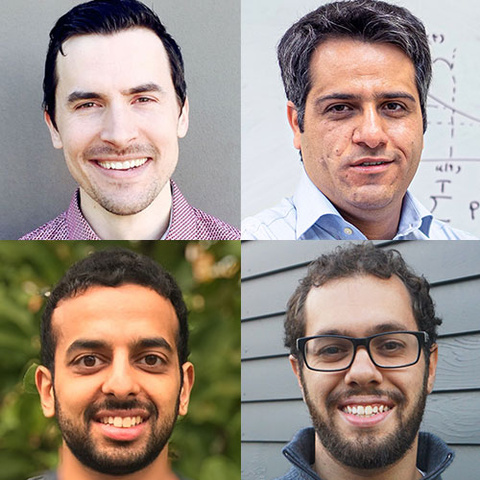Four CICS Faculty Receive 2021 NSF CAREER Awards

Four UMass Amherst College of Information and Computer Science faculty members—Associate Professor Justin Domke, Research Assistant Professor Mohammad Hajiesmaili, Assistant Professor Mohit Iyyer, and Assistant Professor Cameron Musco—have recently received CAREER grants from the National Science Foundation (NSF), among the most prestigious grants that the NSF offers.
The NSF’s CAREER program is intended to provide junior scholars who have the potential to serve as role models, both in their research and teaching activities, with significant funding. The ultimate goal of the grant program is to help cement the foundation for a lifetime of integrating research and teaching activities.
Hajiesmaili, an expert in carbon-intelligent computing and data-driven online optimization, will use his grant to continue studying how to decarbonize the internet. An enormous amount of energy, often derived from fossil fuels, is required for streaming music and video, running data centers and hosting large data-crunching applications. Indeed, by 2030 computing is projected to account for around 10% of the world's energy demand. Any serious attempt to grapple with global climate change will therefore have to address energy use in the digital world. Hajiesmaili's work aims to develop new methodologies so that massive distributed systems, such as those operated by Google, Amazon, Microsoft, and Apple, can reliably draw on low-carbon energy sources, such as wind, solar, or hydro power, twenty-four hours a day, with no loss in computing performance.
Domke’s work also engages machine learning, but is more focused on probabilistic models, or models that combine data with an expert’s background knowledge to make reliable predictions. These models are used widely across science, government, and business. However, such automatic methods work well for only relatively modest problems—the more data there is, the more need there is for an algorithmic expert to manually design an algorithm. This is difficult and reduces the scope of the problem to which probabilistic models can be applied. Domke will spend the five years of his CAREER grant refining and automating the techniques needed for the probabilistic models to work with ever-larger amounts of data.
Iyyer’s research specialty is natural language processing, or the study of how to make computer languages understand human language. Iyyer will spend the next five years building text generation systems that interact with people. Think of these so-called “machine-in-the-loop” writing assistants as digital TAs that can help those who are seeking to learn to write or to improve their writing skills. Iyyer will be working with Protagonist Labs, a private company that runs online platforms for collaborative storytelling, to help generate publicly released models and open-sourced code for other researchers working on natural language generation.
Musco's research focuses on computational linear algebra, which studies how to efficiently solve a host of algebraic problems using computer algorithms. Algorithms for computational linear algebra are critical in many applications, including scientific modeling, image processing and machine learning. Musco will use his CAREER grant to develop new algorithms that vastly decrease the time it takes to solve large-scale linear algebraic problems. One of his main approaches is to use randomized algorithms, which can compute approximate solutions to a problem in far less time than it takes to compute an exact solution.
Each of the CAREER grants will conclude in 2026. Stay tuned for more news of these researchers’ innovative work in the years to come.